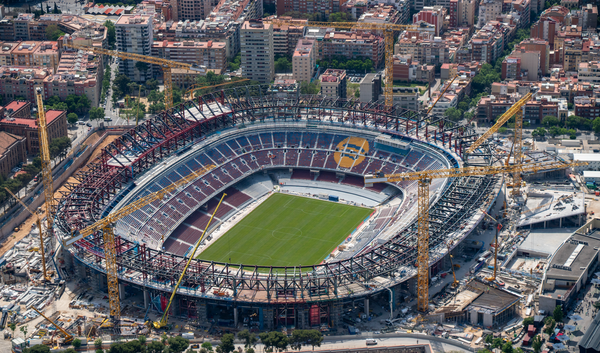Barcelona are young and exciting. But Barcelona are also still naive and inexperienced
Barcelona’s fault was never capitalising on their controlled phases and then shutting off when it mattered the most

Barcelona are the spitting image of their coach. Just like Xavi, Barcelona are young and exciting. Just like Xavi, Barcelona are aggressive and intense. Just like Xavi, Barcelona want it all and they want it now. But also like Xavi, Barcelona are still inexperienced. Also like Xavi, Barcelona are often reckless and naive; they live and they die by their choices and decisions.
Manchester United, on the other hand, are also a young team. If anything, Erik Ten Hag has had even less time at the wheel than his Catalan counterpart. But his team also feels more mature, more adaptive and even more so than that, they are a team that has more bite to them. And perhaps, that is to be expected.
After all, Ten Hag’s resume speaks for itself, even if his only other big tenure was at Ajax. Still, these details matter. It matters when you have experience in Europe, playing against other top European teams. It matters when you have lived the pressure of those unforgiving nights as a coach, dancing on the knife’s edge. And it matters when you have the leisure of a total rebuild behind you. Barcelona have no such thing.
But Barcelona - and Xavi - also made their own bed again. It was Xavi’s decision to dig a hole too deep in the first leg and it was his choice to wait too long to react in the second. Once again, Barcelona showed both their brilliance but also their immaturity. The first 45 minutes at Old Trafford were one of their best performances on European soil in a long time. And that too against Ten Hag’s Manchester United.
Not only that but Xavi decisively won the first-half battle. Unfortunately, Ten Hag still won the war. But Barcelona were well prepared for whatever The Red Devils threw at them in the first 45: they were compact in both phases, coordinated and intense when pressing, composed in their build-up and most of all, they knew how and where to exploit United’s flaws. In my tactical preview of the match, I highlighted the narrow pressing structure Ten Hag usually deploys and the orientation of their full-backs that follows.
If the wingers are narrow in their pressing, that leaves the opposition full-back free to receive the ball. Unless, that is, he’s pressed by the other full-back. So the first step in ensuring your player remains free is to pin his marker deep with a forward or a midfielder positioned high and wide. With Raphinha holding width, for example, Jules Kounde would remain free to receive a pass in the build-up phase because Luke Shaw was being pinned high up by the Brazilian.
The second step is then ensuring you can access that free man. Since Manchester United’s wingers curve their runs when inverting towards the middle, a low pass from the centre-backs is generally unavailable. But Xavi knows he has Marc-Andre ter Stegen between the sticks and the German was once again nigh-perfect in possession of the ball. This gives you an option of a direct lofted pass over the pressing winger and into your full-back. The other option is using a dropping midfielder in a third-man sequence to lay the pass off to the side. Barcelona used both of these aspects to easily bypass the press and progress play cleanly via the flanks.
The midfield was very fluid, and mobile, all the while creating and retaining their numerical and dynamic superiority. Sergi Roberto and Frenkie de Jong would exchange positions, Franck Kessie was used in a more disruptive and aggressive role attacking the channels and Sergio Busquets swept everything trying to break through while also staying the calmest player under pressure. The only thing missing was the final touch, as is often the case. Granted, Barcelona didn’t create much but the environment to do so was nigh-perfect. Xavi had orchestrated the stage to the very last detail and the only thing that remained was to execute the screenplay. But Europe, as we’ve come to realise, is unforgiving. If you don’t take your chances or even if your dominance and control can’t culminate in goals, you will eventually pay the price. And that’s exactly what happened.
Ten Hag obviously played a big part in making that happen, too. Yes, he may have been outwitted in the first half but his changes broke the game in the second. He noticed Alejandro Balde pushing up when pressing was leaving Andreas Christensen isolated while covering the left flank. So instead of having Bruno Fernandes there for no effect, he tweaked the structure, put Antony, a runner, in and made Barcelona pay for their high defensive line. Their second goal to turn the tie around may have come about after two seemingly fortunate deflections but the fact a Manchester United player was first to the ball three times in a row is no coincidence. It only speaks of Ten Hag’s rigidly compact structure in and out of possession. Indeed, the Dutchman came out in the second half with a point to prove, and prove it he did.
Barcelona’s fault was never capitalising on their controlled phases and then shutting off when it mattered the most. We can’t look past misplaced passes, unforced errors and mentality dips that haunt this team. That too is a sign of an inexperienced and naive collective. But it is also a sign of an inexperienced coach. You can’t expect to rotate and get away with it all the time. And you can’t expect to use the same approach in spite of the drastically different profiles you have available and still perform at the highest level possible. Those things are on Xavi.
So how do we move forward after this? In essence, this shouldn’t put the project under a serious question mark. Yes, it was far from a perfect game but Manchester United beating Barcelona is not the upset many think it is. Ten Hag is, after all, for now, the superior coach and that showed at the end of the day.
But Barcelona tangoed with one of the most promising projects in Europe and still held their ground. A couple of years ago this exact Manchester United side would’ve blown them out of the water.
Trust the process.




